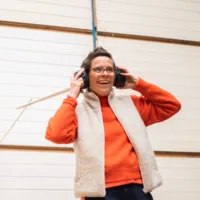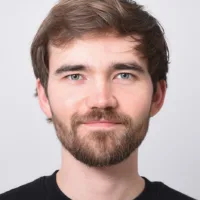FAULT LINES: KABK Research Forum 2024
Friday, 31 May, KABK Auditorium
On 31 May the Deep Futures Research Group hosted a day of exchange centred on our projects-in-progress and collective thinking around art, design and research in relation to climate justice.
Chaired by Alice Twemlow, research professor at KABK, the Group comprises KABK tutors, whose research practices engage with the central theme of the Design Lectorate — making, teaching and researching in the context of climate catastrophe, planetary degradation and the loss of biodiversity. We meet every few weeks in each other’s studios and sites of research, where we engage with the work, read texts, write, and think with each other through the doubts, dilemmas and complexities of our individual projects and the methodological or thematic composite that connects us.
For this event, in the KABK auditorium, we were joined by some of our students and colleagues from KABK, as well as three keynote speakers who we invited to help frame and contextualise our work: Pilvi Takala, Staci Bu Shea, James Auger, Annika Kappner, Kate Scardifield and Filipa Ramos.
We are grateful for everyone's participation in this day of exchange centred on our individual projects and collective thinking around art, design, research and climate justice and look forward to continuing the conversation well into the near, if not the deep, futures.
Many thanks to all involved in making the event such a success, including:
Jungeun Lee and Kay Pisarowitz: Fault Lines 2024 Identity Design
Bianca Meilof: Fault Lines project manager
Alek Kurniawan: Sound
Hana Spillerová: Production assistant
Lou Top, Clara J:son Borg: Production KABK
Frans ten Bosch, Joop Bodaan: Facilities KABK
Special thanks to:
Lola Brancovich, Lila de Coninck, Jedrzej Eltman, Raphael Diederen, Wouter van den Elzen, Inge Kengen, Inga Hirsch, Bokyoung Kim, Anaïs Lossouarn, Wiggo Mott, Charlotte Roschka, Michelle O’Higgins Theilmann: ArtScience students
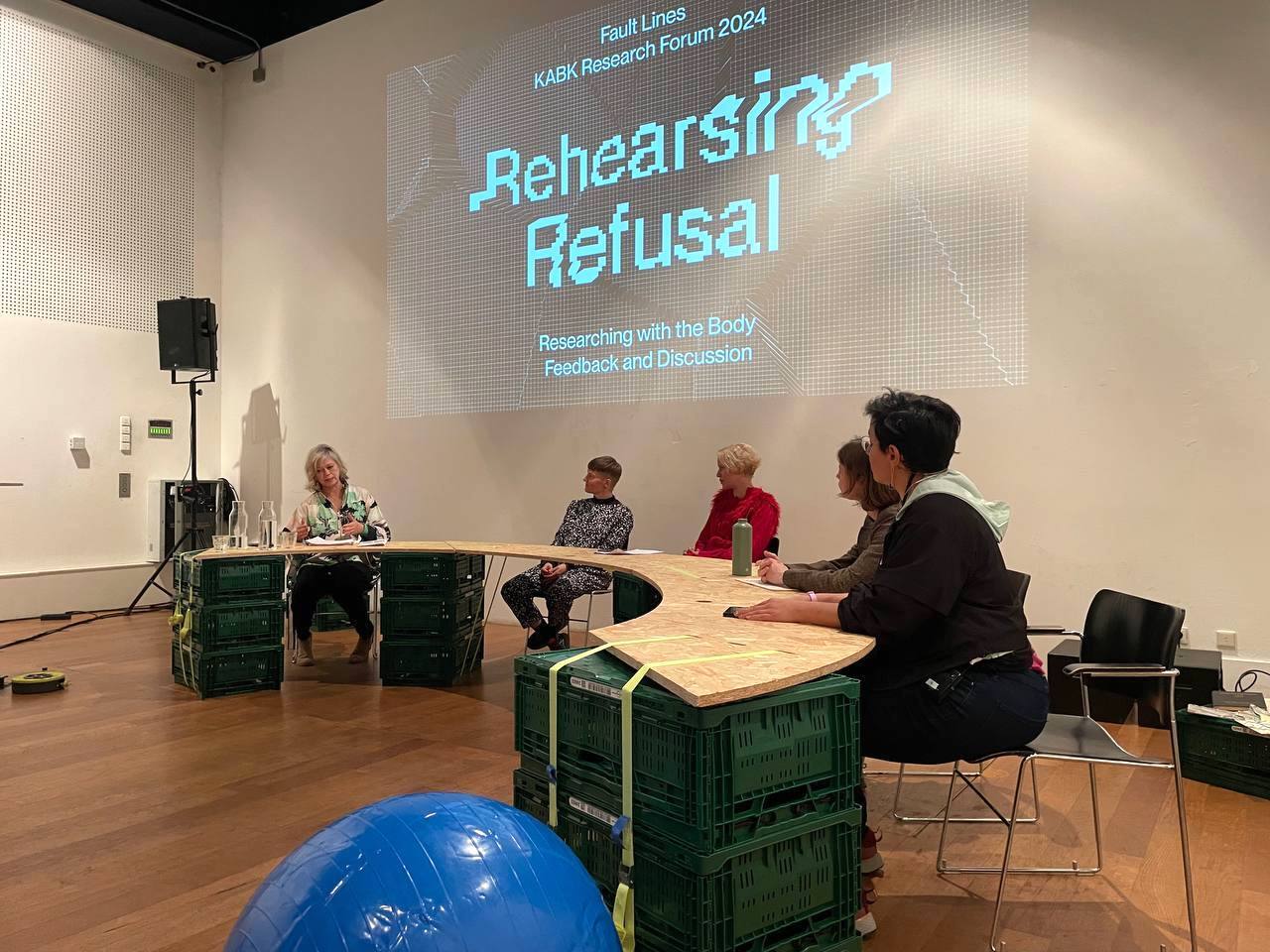
Welcome & Introduction
Dr. Alice Twemlow, Design Lector KABK
Rehearsing Refusal: Researching with the Body
Pilvi Takala, Invited speaker-respondent
Noa Marthe Prins, If Not a Worker, Who am I?
Staci Bu Shea, Invited speaker-respondent
belit sağ, Embodying the Historical: the Veghel Labour Dispute
Critical feedback and discussion
Transducing: Researching with Energy
James Auger, Invited speaker-respondent
Boudewijn Buitenhek, The Path of Electrons: Involving Energy Use in Artistic Practice
Annika Kappner, invited speaker-respondent
Marlot Meyer, Sensitive Systems: Alternative Methods for Mapping Bodies
Critical feedback and moderated discussion
Re-enchanting: Researching with the More-than-Human
Kate Scardifield, invited guest-respondent
Cocky Eek, Dark Skies and the Art of Dreaming
Filipa Ramos, invited guest-respondent
Georgie Brinkman, We are Sky-Breakers
Guest speakers

James Auger is director of the design department at the École Normale Supérieure Paris-Saclay (ENS), co-director of the Centre de Recherche en Design (ENS / ENSCI Les Ateliers) and an Associate Professor at RMIT Europe. His work explores ways through which practice-based design research can lead to more considered and democratic technological futures.
James has an MA in Design Products and a PhD in practice from the Royal College of Art. Between 2005 and 2015 James was part of the critically acclaimed Design Interactions department at the RCA, teaching on the MA programme and continuing his development of critical and speculative approaches to design and technology. After stints at Media Lab Europe (MLE) in Dublin and the Issey Miyake Design Studio in Tokyo, James founded the Reconstrained Design Group at Madeira Interactive Technologies Institute (M-ITI) in Portugal, exploring the potential of the island as an experimental living laboratory through a combination of fictional, factual and functional multi-scale energy-related proposals and projects. This work was awarded the Cultural Innovation International Prize by the Centre of Contemporary Culture of Barcelona (CCCB) in 2017.
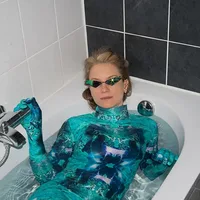
Annika Kappner is a Berlin-born and Amsterdam-based visual artist and researcher. Within the expanded field of painting, Annika creates sensory scenographies that combine landscape, installation, performance, guided meditation, scent and sound to generate glitches in perception.
Annika’s multidisciplinary practice explores the interconnected evolution of consciousness and archetypal imagery, as well as its reflection on the shifting perception of (self) image and The Other. The artist’s research approach is participatory and collaborative, intertwining rational analysis and her own background in finance with embodied experience and intuition.
Her work layers experiential perspectives unto the relationship between human, nature and technology, and addresses concepts of non-duality and otherness, to encourage the emancipation of our way of sensing our surroundings.
Annika’s ongoing and ever-evolving research project, ‘Deep Planetary Sensing’, has been in
development since 2019. Additionally, she is a co-founder of the artist collective Elephants & Volcanoes and co-curator of the Holistic Technology Salon at V2, Lab for Unstable Media, a series of community events and podcasts that explore alternative forms of relating technosphere through the somatic and ultrasensorial.
Her work has been exhibited in the Netherlands at Het Nieuwe Instituut, IMPAKT, Marres House for Contemporary Art Maastricht, MBOT, and Sonic Acts, and internationally at Bienal Internacional de Arte Amazónico (PE), National Museum of Natural History, Menton (FR) and Rush Arts Gallery, New York (US).

Filipa Ramos is a writer and curator. She is a lecturer at the Arts Institute of the HGK/FHNW, Basel. Her research focuses on how contemporary art engages with nature and ecology. Filipa is curator of the Art Basel Film sector and a founding curator of the online artists’ cinema, Vdrome.
Current projects include BESTIARI, the Catalan representation at the 60th Biennale di Venezia (2024) and the arts, humanities and science festival The Shape of a Circle in the Mind of a Fish (since 2018, with Lucia Pietroiusti). In 2024, she curated Songs for the Changing Seasons for the first Klima Biennale Wien (with Lucia Pietroiusti), In 2022, Persons Persone Personen, the 8th Biennale Gherdëina (with Lucia Pietroiusti). In 2021, she co-curated Bodies of Water, the 13th Shanghai Biennale (with Andrés Jaque, Lucia Pietroiusti, Marina Otero Verzier and Mi You).
Filipa was editor-in-chief of e-flux criticism (2013-20), associate editor of Manifesta Journal (2009-11) and contributor for Documenta 13 (2012) and 14 (2017). She authored Lost and Found (Silvana Editoriale, 2009) and edited Animals (Whitechapel Gallery/MIT Press, 2016). Her upcoming book, The Artist as Ecologist, will be published by Lund Humphries in 2024.
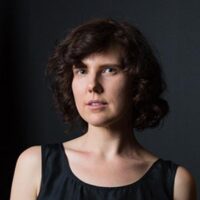
Kate Scardifield has a research-driven and experimental studio practice traversing textiles, sculpture, installation and video. Her work intertwines material investigations, archival collection-focused research, and interdisciplinary exchanges to trace materials through various states of transformation, generating different types of encounters with materials and different forms of material knowledge. Her current projects investigate designing with algae-based biopolymers, biomaterials for carbon capture and storage, and textiles as propositional instruments for navigation, transmission and communication.
Kate is an associate professor and co-director of the Material Ecologies Design Lab at the University of Technology Sydney. She is currently in residence at the C3 Institute (Climate Change Cluster) in the Faculty of Science, where she leads projects exploring the development and application of biomaterials in architecture and design.
Recent exhibitions include ‘Pliable Planes’, UNSW Galleries (2022); ‘FREE/STATE’, Adelaide Biennial of Australian Art, Art Gallery of South Australia (2022), ‘The lighter a thought the more it rises’, Toi Moroki Centre of Contemporary Art, Christchurch, New Zealand (2019) and ‘Soft Topologies’, UTS Gallery, Sydney (2018).
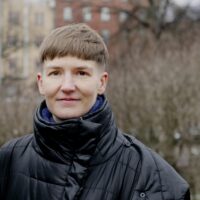
Pilvi Takala is an artist who lives and works in Berlin and Helsinki. Her video works are based on performative interventions in which she researches specific communities to question social structures. In her practice she shows that implicit normative rules for behaviour are often only revealed through disruption.
Pilvi represented Finland at the 59th Venice Biennial 2022. Her work has been shown at Migros Museum für Gegenwartskunst in Zurich, the Seoul Mediacity Biennale, Kiasma Museum of Contemporary Art, CCA Glasgow, Manifesta 11, Centre Pompidou, MoMA PS1, Palais de Tokyo, New Museum, Kunsthalle Basel, Kunstinstituut Melly, and the 9th Istanbul Biennial.
From artist and associate professor, University of Technology Sydney Kate Scardifield:
‘I had the honour of visiting KABK in June 2024, on the occasion of the 6th edition of the Fault Lines Research Forum, organised by the Design & the Deep Future Research Group. Chaired by Dr. Alice Twemlow, Design Lector, and organised by a well-organised group of tutors and students, the forum creates a fundamental occasion for sharing, discussing and problematising the research projects that are being developed by tutors, staff and students.
The fact that the forum is open, public, and brings together external professionals with those affiliated to the Research Group, generates an important platform for the exchange of ideas, contacts and both artistic and academic knowledge, which otherwise remain locked within their atomised areas of work.
I was particularly impressed by the quality of the individual projects presented during the encounter, and how they were original in their approaches and methodologies while attending to some of the most pressing issues concerning our present-future, from ecology to gender and feminist struggles, mortality and care politics. Art and Design were treated as valid and crucial epistemological tools to engage with the real, as important as those from any other disciplinary background, and the fact of treating creative thinking and making seriously is key to assert the continuation their relevance for society at large.
The encounter was also a major source of inspiration, as I returned to my own academic work environment praising the incredible outcome of KABK’s research and sharing with my peers a series of references and ideas concerning positive work practices and methodologies’.
From Finnish video artist Pilvi Takala:
‘It was a privilege to take part in the Fault Lines Research Forum and to get to dive into so many intriguing lines of research. I especially appreciated the strong focus on process and hands-on field work.
I was impressed by Noa Marthe Prins’ practice of using her own body as resource, a site of conflict to explore and excavate. Also the way the four presentations in our section resonated with each other through points of connections around the body, care and vulnerability was inspiring. Dsend me invites to future performances and also if you have documentation, happy to see that. And would love to stay in touch and hear where the projects go’.
From curator, writer, holistic death care worker, Staci Bu Shea
‘As an invited speaker-respondent to artist and tutor belit sağ for the 2024 KABK research forum Fault Lines, I got a window into the rich and nourished environment that the Design Lectorate seems to cultivate.
The quality and detail of belit’s research, along with the other fellows, shows how valuable this format is for tutors. It helps hold a high standard of generative and rigorous peer-to-peer engagement with one's work, and undoubtedly emboldens the tutors’ guidance of their students’.
From artist Annika Kappner:
‘Thank you again for facilitating this beautiful and vital space for research and exploration. I am very happy to be in touch regarding the further evolution of Marlot Meyer’s individual research, as well as the group’s collective research.
Fault Lines is an extremely valuable space for critical exploration and collective knowledge creation through a diverse range of complementary research methods. Through this unique format crucial social, ecological and political questions are addressed furthering the field of artistic and design research in a unique and collaborative way’.
From Art Basel Film curator Filipa Ramos:
‘Thank you so much for having me at KABK. I was very impressed by the quality of the discourse and projects presented and it was an extremely rewarding and meaningful encounter to be part of. I truly hope we find an occasion to collaborate again in the future’.
From James Auger, director, design department at ENS Paris Saclay and co-director, Centre de Recherche en Design (ENS & ENSCI):
‘Many thanks for the invitation to participate in the KABK Design Lectorate. It was a pleasure to experience both the presentations of the researchers and the discussions with the invited guests.
This is an original and stimulating format and it provided a great opportunity to discuss the complexities of our interactions with energy and its infrastructure with Boudewijn - I look forward to seeing how his research evolves!’
From the designers:
‘Congratulations once again on the successful forum. We were really happy to see everything come together, along with everyone's outstanding presentation. I really hope you've had the chance to take a well-deserved break and recover from the hectic period. It was a pleasure working with you, and we are extremely pleased with what we accomplished together. I hope you also feel the same way. Have a wonderful day and greetings from us!’
Research Group members
KABK Design and the Deep Future Research Group
Each year the Royal Academy of Art The Hague (KABK) makes provision for a selected group of its tutors and staff to work on self-defined research projects in the context of a Research Group. The nature of these projects varies, from research driven by and through one’s own artistic or design practice to historical or theoretical research; from material or technological research to academic research in preparation for a PhD-trajectory. In monthly meetings, chaired by Dr. Alice Twemlow, we discuss participants’ progress and questions related to methods for research and analysis, theoretical concepts, and modes of dissemination. Each year the Design Lectorate hosts Fault Lines where participants of the Research Group share their research-in-progress with the KABK community of colleagues and students, as well as invited external speakers/ respondents.
